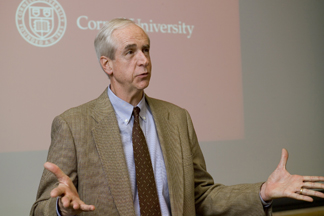From language to engineering, Cornell and China have ties that bind, Rawlings notes in speech
By George Lowery
The man who revolutionized the Chinese language, Hu Shih, a 1914 Cornell graduate, and a number of other notable Chinese alumni are part of a century-long association between Cornell and China.

And with the university's new China and Asia-Pacific Studies program, this relationship between Cornell and China keeps growing stronger, Cornell President Hunter Rawlings noted in an April 13 lecture, "From the Chinese Literary Renaissance to Ping-Pong Diplomacy: A Century of Cornell-China Partnership." He spoke to a capacity audience in Goldwin Smith Hall in a talk co-sponsored by the Class of 2006 Council, the history department, the East Asia Program and the China and Asia-Pacific Studies program.
Rawlings said that Hu, who would serve as China's ambassador to the United States from 1938 to 1942, was originally an agriculture student who felt obliged to learn something immediately useful to his country. But after struggling with botany and pomology for two years, Hu followed his heart and transferred to the College of Arts and Sciences to study philosophy.
While he was still a Cornell undergraduate, Hu led the movement to replace classical Chinese literary language with the living language, the pei hua. This transformation, Rawlings noted, "made literature and learning accessible to large numbers of the Chinese people for the first time and positioned China to play a more prominent role on the world stage."
Rawlings quoted Hu on his "conversion" to the humanities: "... I am by nature suited for only one or two things. He who rebels against nature and denies his own endowments will accomplish little. From that time forward I changed my occupation, and again argued points of scholarship and politics."
Said Rawlings, "I want to emphasize Hu Shih's last point very strongly: He highlighted the need to be true to your own nature as well as the deep significance of literary and philosophical studies."
Other Cornell-China facts that Rawlings mentioned:
- In 1879, Cornell's first Chinese-language course attracted almost 10 percent of the university's 463 students.
- The Full-Year Asian Language Concentration program, established in 1972, enables its students to speak Mandarin all day, every day for a year.
- Lee Teng-Hui, Ph.D. 1968, was the first Cornell graduate to become a head of state (Taiwan).
- Alfred S. Sze, Class of 1901, became China's ambassador to Washington; his brother, S.C. (Tommy) Sze, Class of 1905, helped modernize China by putting his engineering degree to work to build railways and power plants.
- In 2001 Tommy Sze's son, Yao Yuan Sze, endowed the directorship of Cornell's Sibley School of Mechanical and Aerospace Engineering in honor of his father.
"We are on the cusp of a new era in our relations with China -- and the exchanges in both directions are growing," Rawlings said. "In fact, what in the early years of Cornell's renewed ties with China was a trickle of initiatives has now become a flood.
"Cornell is poised to become the university that produces the new Hu Shihs, Alfred and Tommy Szes ... of China for the 21st century."
Media Contact
Get Cornell news delivered right to your inbox.
Subscribe